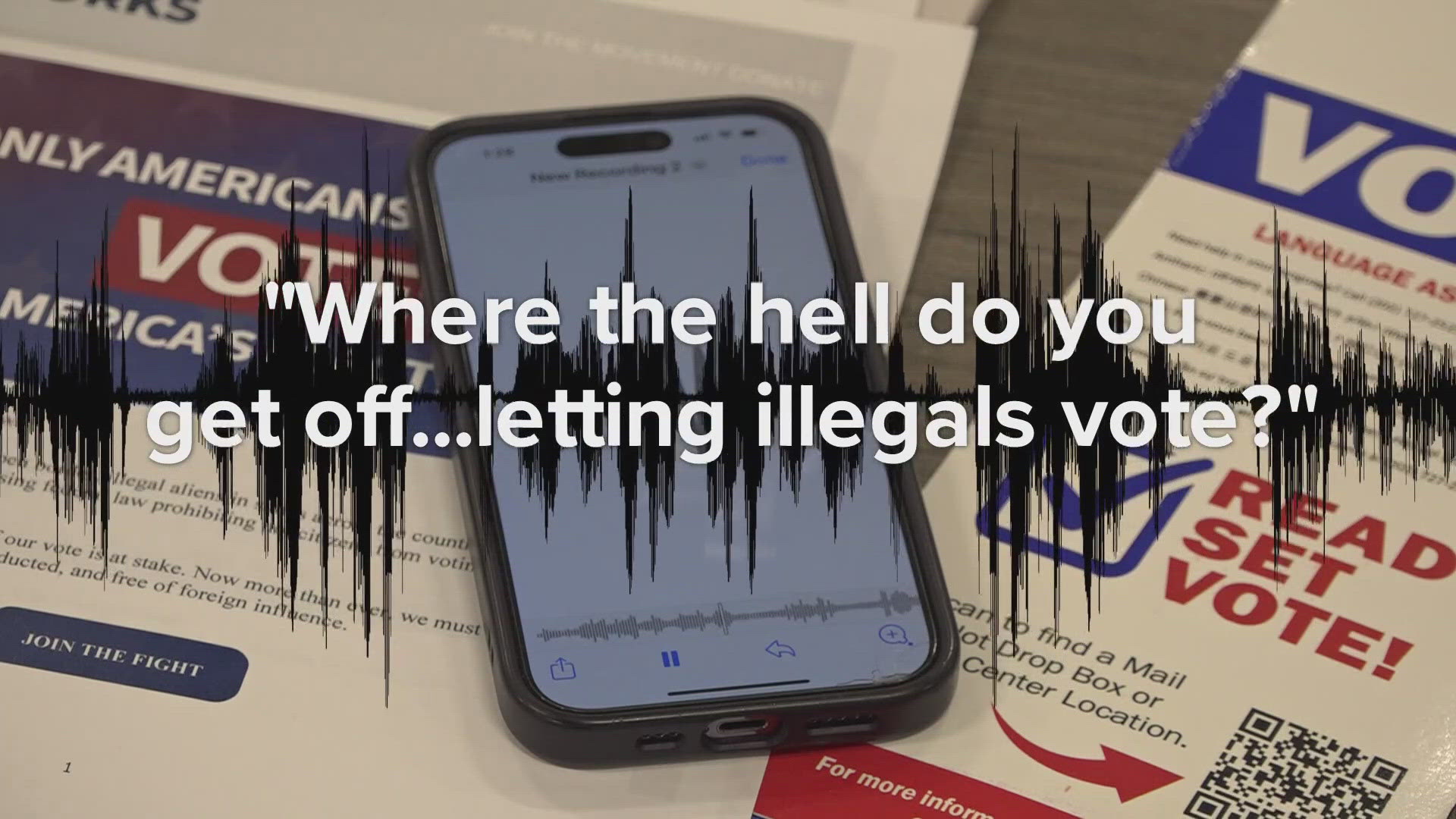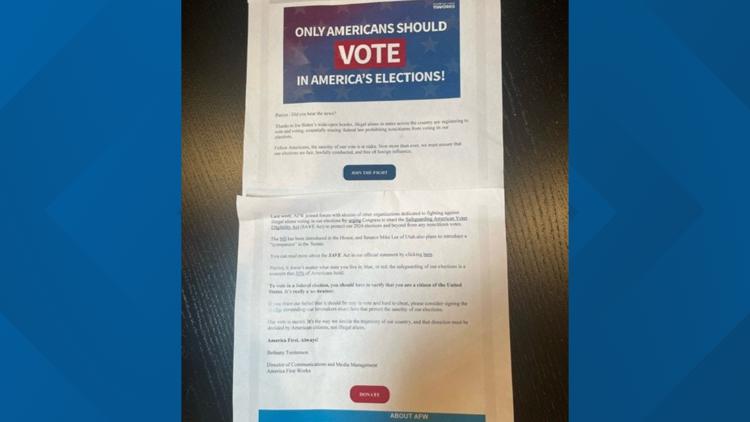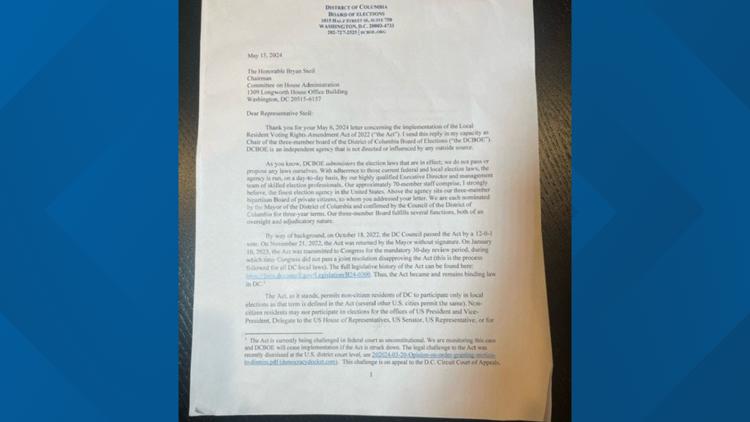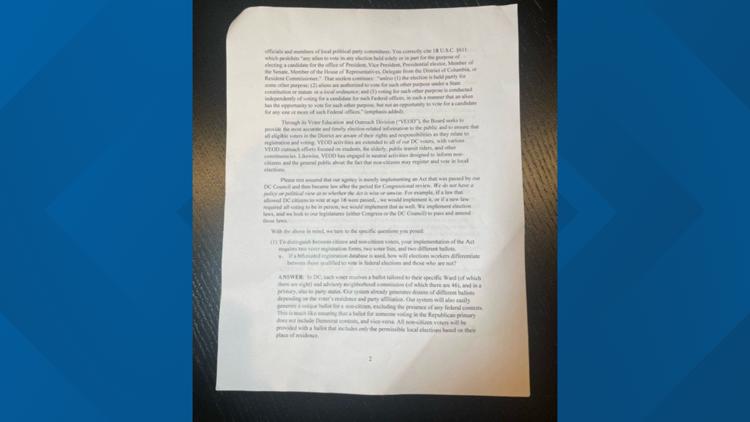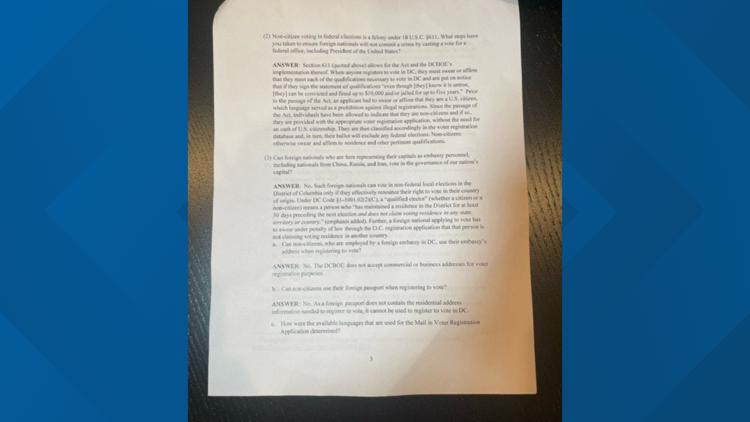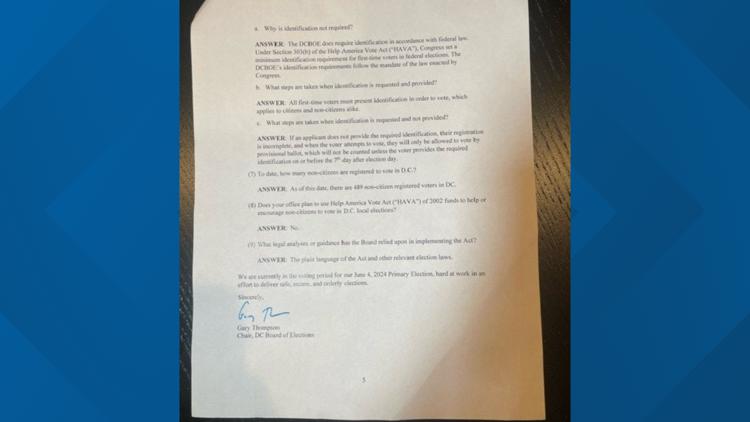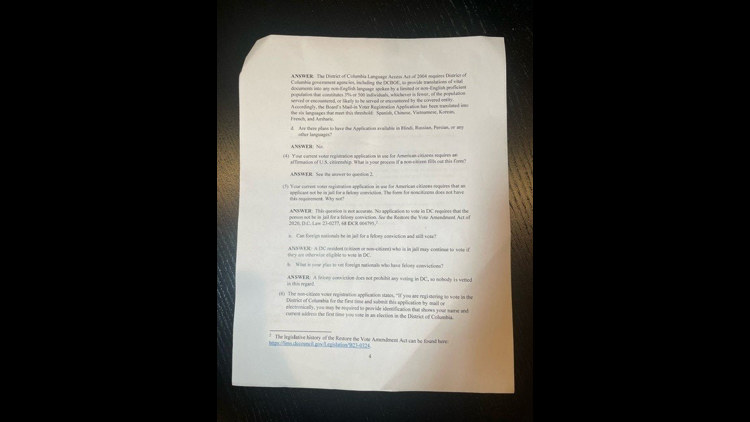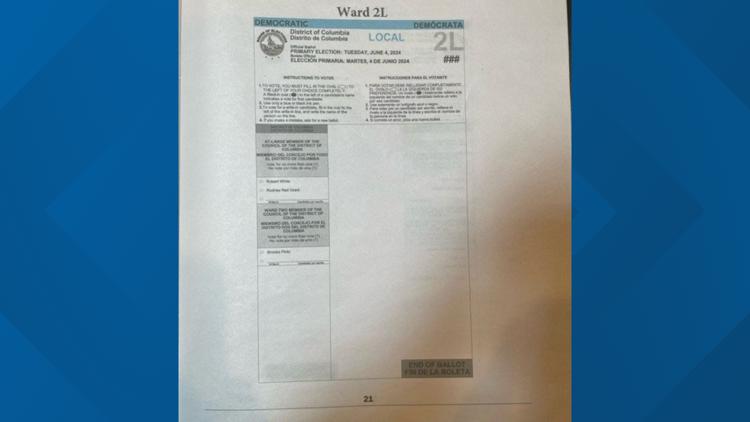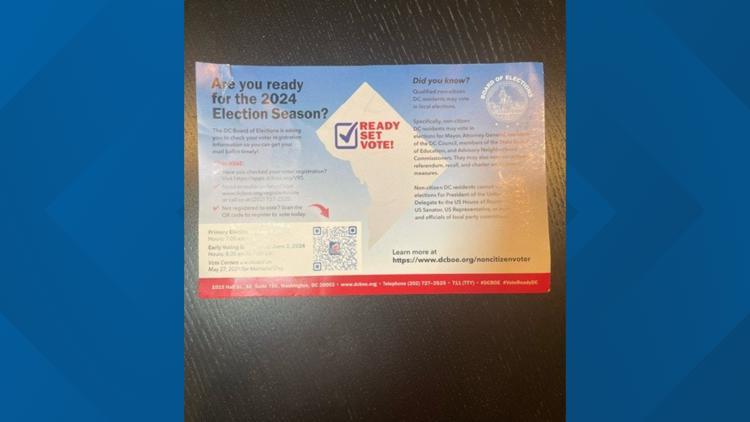WASHINGTON — As D.C.'s primary approaches, non-citizens will be able to make their voices heard for the first time ever with ballots. Because of the law granting them this right, the Board of Elections has been receiving threats.
Executive Director Monica Evans said in addition to outright threats, her team has received angry calls and emails.
She played one voicemail where a woman can be heard shouting, "Where the hell do you get off letting illegals vote? This is the nation's capital. You are traitors -- traitors to our country!"
This year will be the first time non-citizens are legally allowed to vote in D.C.'s local elections. That still is prohibited in federal elections.
The DC Council unanimously passed the legislation in 2022.
It allows anyone who has lived in D.C. for at least 30 days and does not maintain voting status in another state or country to vote in the city's local elections.
They have to bring proof of residence to a polling place to register to vote in the primary.
“We have people who are very much in favor of the legislation, and people who are opposed to the legislation," Evans said. "We’re fine with that. It becomes problematic when there’s reckless language. It becomes problematic when there’s threatening language. It becomes problematic when people are addressing us with anger, because we're just doing our jobs."
Evans emphasizes that their job is to implement these policies -- not to create or pass them.
She said the angry messages started picking up toward the end of April, and the BOE has since launched an investigation into the threats.
Evans believes the national spotlight on this legislation is fueling the dangerous discourse.
For the past year, multiple members of Congress have attacked the law in oversight hearings and in the media.
Last week, 52 House Democrats joined Republicans in voting to overturn it for the second time, with a margin of 262 to 143.
The House voted to do the same last year, but the initiative died in the Senate.
One of the representatives leading the charge is Wisconsin Congressman and House Administration Chairman Bryan Steil.
“Our nation's capital here in D.C. is the front door to the entire country. And so we need to make sure that we're protecting the integrity of our election here in our nation's capitol," Rep. Steil said. "Under current D.C. law, an individual working at say the Russian embassy residing in D.C. for simply 30 days would be eligible to cast a ballot in this November's election for city council. That's not the right move."
Board of Elections Chair Gary Thompson calls this and other claims misinformation.
“This talking point that somebody who works in the Russian embassy can come down and vote is just wrong," he said. "I think the people who are going to vote by and large are people who are here, lawfully, permanently, you know, maybe green card holders. They work in D.C.; they pay taxes in D.C.; they've made this their home; they contribute in many ways to our community. And, you know, our elected representatives have decided that they should vote in local elections."
Elected representatives in multiple other jurisdictions across the country have made that same decision.
Cities and towns in California, Vermont, and Maryland all have laws granting non-citizens the right to vote in certain local elections.
"I think non-citizens, for the most part, would like to be heard on these issues that involve, you know, their own kids schools, and, you know, the traffic on their own streets," Thompson said.
As of Wednesday, May 29, the Board of Elections said 523 non-citizens have registered to vote. 310 registered Democrat, 28 Republican, 16 Statehood Green, and 169 Independent.
“Congress is now you know, butting in and has something to say about it," Thompson said. "I don't think it's because they care about D.C. I think it's because they are wanting to have a discussion on a broader national level that impacts national level politics. And we're just happenstance [here.]"
Congress has oversight over D.C. laws and could have prevented it from being enacted during its 30-day Congressional review period, but they didn't take it up at that time.
The House Administration Committee held an oversight hearing last June, however, at which Evans testified.
Then, earlier this month, Rep. Steil sent the BOE a letter asking a series of questions about election security when it comes to non-citizens voting.
Some of those questions included distinguishing between non-citizen and citizen ballots, preventing foreign nationals from voting, and checking citizenship and felony status of a voter.
He also wrote about some of the mailers the BOE sent out: "The Committee has received notice regarding a postcard mailed by the Board to 'Residential Customers' advocating for non-citizens to register to vote in D.C. elections."
The BOE sent their own response answering each question. To the advocacy assertion, they said they do not take a stance on the policy -- they were simply informing voters of their rights, as their job entails. They shared the postcard to which the Congressman referred (see below).
It reads in part, "Did you know? Qualified non-citizen DC residents may vote in local elections. Specifically, non-citizen DC residents may vote in elections for Mayor, Attorney General, members of the DC Council, members of the State Board of Education, and Advisory Neighborhood Commissioners. They may also vote on initiative, referendum, recall, and charter amendment measures. Non-citizen DC residents cannot vote in elections for President of the United States, Delegate to the US House of Representatives, US Senator, US Representative, or members and officials of local party committees."
Evans and Thompson said they have a robust security system to ensure the integrity of DC's elections.
That includes separating ballots for citizens and non-citizens, so non-citizens receive ones that say "Local" at the top and do not include any federal elections (see below).
DC BOE workers threatened over non-citizen voting law
Evans said all of this attention has unfairly put the heat on D.C. election workers.
“It’s really my biggest concern in this election cycle," she said. "And so we do have armed security this year -- the first year we’ve had to do that at our offices, and we’re being very diligent.”
Rep. Steil also denounced these threats the BOE has been receiving.
"There's absolutely no place for threats. This is a policy conversation and policy conversation should be argued using words," he said. "There's no place for political threats of any stripe in our entire country, no place for it. That said, where we have strong policy disagreements, we should do exactly what we're doing here. We should bring legislation to the floor, inform the American people where laws are that we disagree with, and then pass better legislation."
On the Board of Elections' part, Evans reminds the public that they are only doing their jobs -- implementing policies.
She also said they offer visits to the public to see how they complete quality checks of their voting systems and count ballots. Periodically, they put out press releases with information on how to sign up.
The DC Primary is scheduled for June 4 from 7 a.m. to 8 p.m.
RELATED: DC Primary Voter Guide for 2024

